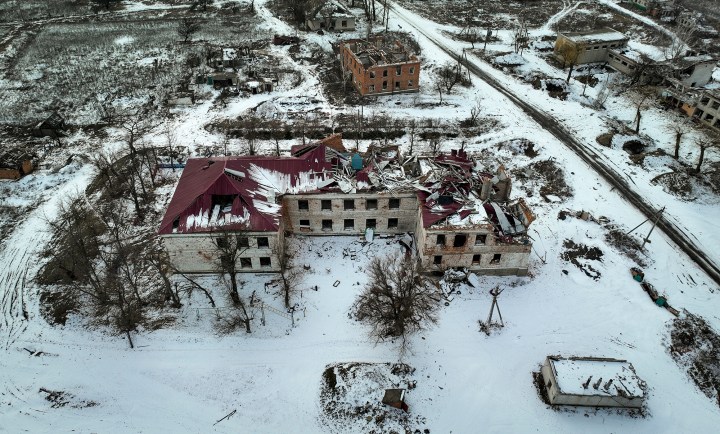UKRAINE UPDATE: 14 FEBRUARY 2024
US Senate passes $95bn aid Bill, but House showdown looms; Russian drones strike Dnipro

The US Senate approved $95bn in assistance for Ukraine, Israel and Taiwan after months of delay, but the legislation still faces formidable obstacles in the House.
Russian drones severely damaged an energy facility in the central Ukrainian city of Dnipro early on Tuesday, disrupting water and power supply and triggering a temporary school shutdown and hospital evacuation.
China said it firmly opposed “illegal sanctions” in response to a European Union proposal to impose trade restrictions on three Chinese firms as part of efforts to hobble Russia’s war machine.
Russia was likely to leverage its advantage in ammunition stockpiles this year and could occupy more Ukrainian territory if crucial aid isn’t delivered to Kyiv, according to an annual report by the Estonian Foreign Intelligence Service.
US Senate approves Ukraine aid, but Bill faces House battle
The US Senate approved $95-billion in assistance for Ukraine, Israel and Taiwan after months of delay, but the legislation still faces formidable obstacles in the House.
The uncertainty over more US aid persists as Ukraine struggles with dwindling supplies, infighting among the country’s leaders and Russian forces on the offensive.
After a gruelling all-night session, the Senate voted 70 to 29 early on Tuesday to approve the emergency national security funding package, which includes $60-billion in war aid for Ukraine alongside funding for Israel, Taiwan and humanitarian aid for Gaza.
In the end, 22 Republicans supported it while two Democrats and Independent Senator Bernie Sanders voted against it due to concerns about Israel’s actions in Gaza.
Ukraine’s President Volodymyr Zelensky welcomed the Bill in a statement on X, saying: “American assistance brings just peace in Ukraine closer and restores global stability, resulting in increased security and prosperity for all Americans and all the free world.”
However, any relief felt in Kyiv will almost certainly be short-lived as the legislation has no chance of advancing in the US House anytime soon.
House Speaker Mike Johnson has refused to act on Ukraine until a Republican-only bill to address the migrant crisis at the US-Mexico border is enacted. Democrats, who endorsed a short-lived bipartisan immigration deal last week, say the price of that ransom is simply too high.
Adding to the intensifying stalemate is the 2024 election in general — and Donald Trump, in particular.
The GOP’s likely presidential nominee has directed Republicans not to settle for anything less than a “perfect” deal — an all-or-nothing stance that lets him build his campaign around the worsening problem at the border.
“The House must do everything in its power to stop this nonsense & put America First,” Texas Republican Randy Weber, a Trump ally, said on X of the Senate’s bill.
On its own, the Senate-passed package would pass the House.
But as speaker, Johnson controls what the House does — and doesn’t — consider, and bringing up the Ukraine package would spur a mutiny on his right flank.
That leaves three possible solutions to the standoff, none of which is easy or likely:
- The House could attach conservative border policies to Ukraine aid and try to negotiate that with the Senate;
- President Joe Biden could issue executive orders on the border to ease GOP concerns; or
- House GOP defence hawks could team up with moderate Democrats and force a House vote.
Deep opposition to Ukraine aid from ultra-conservatives threatens to sink the first option. For the second, it’s unlikely Biden would go as far by fiat as Republicans want him to go.
As for the third option, Republican defence hawks in the House, whose votes would be needed, say they won’t buck the speaker. Democrats also can’t count on support from some progressives, who oppose Israel aid in the package.
Russian drone attack damages Dnipro power plant
Russian drones severely damaged an energy facility in the central Ukrainian city of Dnipro early on Tuesday, disrupting water and power supply and triggering a temporary school shutdown and hospital evacuation.
Electricity production stopped at the damaged thermal plant, the power producer DTEK said, adding that engineers were on the site and working to repair the damage and restore operations. There were no casualties, it said.
Dnipro was temporarily shutting down schools and evacuating one of its hospitals, including many patients in palliative care, Mayor Borys Filatov said on Telegram. The measures were prompted by concern that the city’s energy system, damaged by the Russian attack, may fail when colder weather sets in soon, Filatov said.
Ukrainian air defence said it shot down 16 out of 23 Shahed drones launched from occupied Crimea and Russian territory over central and southern regions of the country overnight.
Zelensky said his country’s air defence had shot down more than 350 Russian drones since the start of the year.
China opposes ‘illegal sanctions’ in response to EU proposal
China said it firmly opposed “illegal sanctions” in response to a European Union proposal to impose trade restrictions on three Chinese firms as part of efforts to hobble Russia’s war machine.
“We are aware of the relevant reports,” the Ministry of Foreign Affairs said. “China firmly opposes illegal sanctions or ‘long-arm jurisdiction’ against China on the grounds of cooperation between China and Russia.”
Brussels is considering new restrictions on about two dozen firms, including three based in China and one in India. If member states approve the plan, it would be the first time the EU has imposed curbs on businesses in mainland China and India since Russia invaded Ukraine.
The new proposal would ban European firms from trading with the entities as part of the bloc’s efforts to crack down on Russia’s ability to get its hands on sanctioned goods through companies in third countries. Companies in Hong Kong, Serbia and Turkey also are on the list.
Russia expanding military edge over Ukraine – Estonian spies
Russia was likely to leverage its advantage in ammunition stockpiles this year and could occupy more Ukrainian territory if crucial aid isn’t delivered to Kyiv, according to an annual report by the Estonian Foreign Intelligence Service.
The Kremlin has about three to four times more artillery than Ukrainian forces after boosting its ammunition production to as many as four million units last year, up from 600,000 rounds in 2022, the report said. That gap will widen, since it is “almost certain” that Western deliveries won’t keep pace with Russia’s output.
As aid flows to Ukraine are held up by political infighting, primarily in the US, where some $60-billion in assistance has stalled in Congress, Moscow’s ultimate aim is to press for a better negotiating position, the report said. After President Vladimir Putin’s plans for a “blitzkrieg” assault failed in 2022, the Russian leader is now relying on attrition to gain the advantage, it said.
“If Western aid diminishes significantly in the coming years, Russia will be more likely to gradually occupy large Ukrainian territories with a massive, unskilled force, imposing unfavourable peace terms on Ukraine,” the Estonian agency said.
German Chancellor Olaf Scholz on Monday highlighted the importance of keeping ammunition and other materiel flowing to Ukraine and urged European nations to do more to support the government in Kyiv.
“We know that several thousand artillery shells are currently being fired at the front in eastern and southern Ukraine every day,” Scholz said at a groundbreaking ceremony for an expanded Rheinmetall ammunition facility in western Germany.
Although US and European Union sanctions against Moscow have been effective, especially forcing Moscow’s isolation from global financial markets, Russia’s economy is nevertheless experiencing a war-fuelled boom, the report said.
“The Kremlin is probably anticipating a possible conflict with Nato within the next decade,” the report said, echoing the concerns of a growing list of European officials in recent weeks.
Estonia has become a particular target for the Kremlin. Russia placed Prime Minister Kaja Kallas on its criminal wanted list, state news service Tass reported, citing the Interior Ministry’s database.
Estonia urges EU to seize Russian central bank assets this year
Estonia is pushing the European Union to seize more than €150-billion of frozen Russian assets before the end of the year in an effort to lock in lasting policies that stretch beyond the US election cycle.
EU leaders have sounded the alarm after comments by Donald Trump, the Republican front-runner to return to the presidency, revived worries about the US’s commitment to Nato.
“It’s key that the assets are seized before the end of the year, or preferably by the US election,” Jonatan Vseviov, the secretary-general of Estonia’s Foreign Ministry, told Bloomberg in an interview. “If we wait too long, it could be too late.”
As Russia’s invasion approaches the two-year mark, the EU and the Group of Seven have frozen more than €250-billion in Russian central bank assets and are discussing how the money could be used to contribute to Ukraine’s reconstruction.
The vast majority of the assets are in Europe at clearing house Euroclear in Belgium, where they generated some €4.4-billion in profits in 2023.
The EU is working toward plans to apply a windfall tax on those revenues, with some member states and officials hoping to have a final agreement by 24 February, when the Russian invasion hits the two-year point. It’s unclear whether the deadline is feasible, since several member states have been holding up the process citing legal complexities.
Meanwhile, the G7 has pledged to make Russia pay to rebuild Ukraine and to keep sanctioned assets frozen until it does. Several nations, including France and Germany, have so far resisted the option of confiscating the frozen assets outright due to legal concerns and the consequences it might have for the stability of the euro.
At a technical level, the G7 is exploring the legal feasibility of using the assets as collateral to raise funds for Ukraine.
Estonia is already working through domestic legislation that, if approved, would allow it to eventually seize any Russian assets frozen in the Baltic nation.
Russia’s seaborne crude exports retreat from seven-month high
Russia’s seaborne crude shipments slipped back from a seven-month high — but remained above their 52-week average — as flows settled down after a period in which storms and maintenance caused volatility in the nation’s seaborne exports.
The drop in shipments saw the weekly flow fall by about 290,000 barrels a day in the week to 11 February. That put exports at 200,000 barrels a day above the level Moscow has pledged to its Opec+ partners for the first quarter on a weekly basis. Despite the fall in the weekly figure, the less volatile four-week average rose by about 30,000 barrels a day, putting it very close to the target.
So far, increased pressure from the US Treasury on ships carrying Russian oil appears to be hitting the nation’s vessels and the shadow fleet of ageing tankers Moscow relies on — but it doesn’t appear to be curtailing cargo loadings. Since early October, the US has sanctioned 50 Russia-friendly tankers and about half of those appear to have experienced at least some level of disruption.
Russia has said it will cut oil exports by 500,000 barrels a day below the May-June average during the first quarter, after several other members of the Opec+ group agreed to make further output curbs. The Russian cut will be shared between crude shipments, which will be reduced by 300,000 barrels a day, and refined products. DM




















 Become an Insider
Become an Insider
Comments - Please login in order to comment.